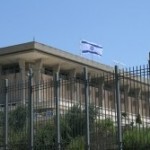 Turkey’s highly-publicized and dramatic downgrade in ties with Israel has targeted diplomacy and military ties, as well as making legal threats. Now the specter of damage to the nations’ economic links has been raised as well, although it appears things remain stable there for now. The Turkish sanctions, first announced last Friday, are an escalation in their demand that Israel formally apologize for the 2010 Gaza flotilla incident.
Turkey’s highly-publicized and dramatic downgrade in ties with Israel has targeted diplomacy and military ties, as well as making legal threats. Now the specter of damage to the nations’ economic links has been raised as well, although it appears things remain stable there for now. The Turkish sanctions, first announced last Friday, are an escalation in their demand that Israel formally apologize for the 2010 Gaza flotilla incident.
On May 31, 2010, Israeli soldiers sent to commandeer the Turkish Mavi Marmara ship in defense of the naval blockade of Hamas-controlled Gaza were attacked by activists. In the resulting melee nine of the activists—all with links to Turkey—were killed. Israel has expressed regret at the loss of life, but Turkey is demanding a stronger apology and compensation for the dead activists’ families.
As a result of the disagreement, the Turks have officially launched“Plan B” in relation to Israel. The sanctions announced by Foreign Minister Ahmet Davutoğlu, and later posted on the Turkish Foreign Ministry website, included a noteworthy downgrade in diplomatic relations so that there is no Israeli ambassador or deputy ambassador presence in the country, as well as a suspension of military agreements.
Potentially more serious is the announced intention by the Turks to challenge the legality of Israel’s naval blockade on the Gaza Strip—intended to prevent arms smuggling—at the United Nation’s International Court of Justice. Israel received a boost to the blockade’s status from the UN’s Palmer Report on the Mavi Marmara affair, which said the blockade was legal while encouraging Israel to continue the process of relaxing their overall restrictions on Gaza. However, the Palmer committee was not intended to be a court of law.
Following the initial announcement of Turkish sanctions, the Israeli Prime Minister’s Office announced on Saturday their response to the UN’s Palmer Report. In the response they addressed their reaction to the Turkish demand for a formal apology without highlighting the demand explicitly.
“Israel once again expresses its regret over the loss of life, but will not apologize for its soldiers taking action to defend their lives. As any other state, Israel has the right to defend its civilians and soldiers,” said the statement.
Meanwhile, though the sanctions apparently have not included trade ties, potential economic damage from the rift is causing concern. Bank of Israel head Stanley Fischer on Monday warned of potential damage to Israeli trade with Turkey, a major player in the Middle East economic stage. In a summary of his speech at the First Conference for Regional cooperation in the Middle East, which was posted on the Bank of Israel website, Fischer noted that Turkey is the largest economy in the region.
The summary paraphrased Fischer as saying, “Turkey is a significant trading partner for Israel, and the consequences of damage to trade with Turkey would be serious for Israel.”
A suspension of trade made headlines briefly by mistake on Tuesday before a clarification was given to an American newspaper. According to The Wall Street Journal, Turkish Prime Minister Recep Tayyip Erdogan told reporters that trade and military ties with Israel would be suspended. But a spokesman for Erdogan clarified to The Wall Street Journal that Erdogan meant that only the military trade was being suspended at this time.
With the back and forth economic damage headlines in the background, the Tel Aviv Stock Exchange watched their flagship index, the TA-25, drop 2.79% on Tuesday.
And concerns about the economic relations don’t appear to be limited to Israel. Turkey’s Today’s Zaman newspaper cited Turkish Exporters Assembly (TİM) President Mehmet Büyükekşi as saying that he did not expect trade to suffer dramatically from the diplomatic fallout.
“We should not mistake business ties for political relations … these are two completely separate issues, we do not expect trade relations to worsen overnight,” Büyükekşi was quoted as saying. Today’s Zaman reported Büyükekşi did not think the Turkish government would impose further sanctions on Israel, nor did he expect Turkish citizens to boycott Israeli goods over the diplomatic crisis. He also didn’t expect sanctions on Turkish exports to Israel by the Israeli government.
For their part, the Israelis have expressed their desire to see things normalize again. In Saturday’s Prime Minister’s Office statement they reiterated past efforts to that aim, as well as their hope good ties will someday be restored.
“Israel cherishes the significant ties, past and present, between the Turkish and Jewish peoples. For that reason, the State of Israel has made numerous attempts in the last few months to settle the dispute between the two countries, but regrettably, these attempts have not been successful,” said the statement.
“The State of Israel hopes that a way will be found to move beyond this discord and will continue its endeavors to that end.”
(By Joshua Spurlock, www.themideastupdate.com, September 6, 2011)
